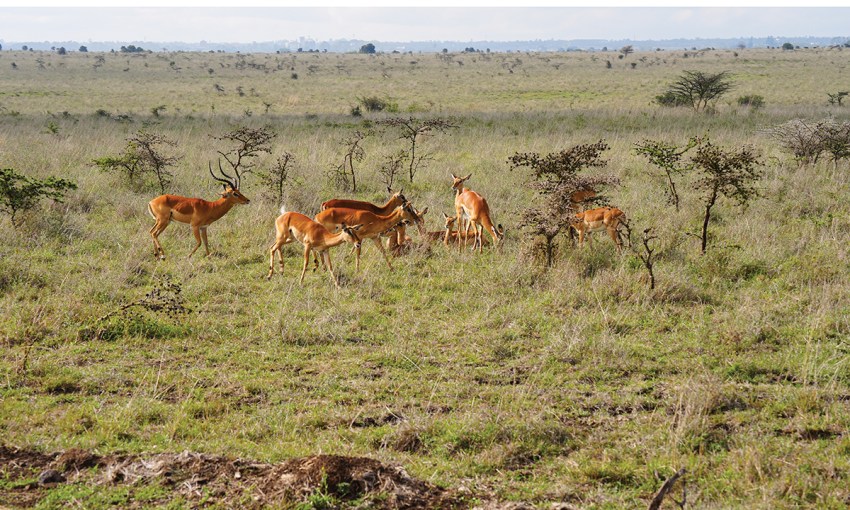Australians are true rose lovers; this passion reaches a crescendo when new varieties make their way to garden centre shelves each year. But how do they actually get there? Rose importer, Kim Syrus, documents his recent rose-buying adventures in Kenya.
Out of Africa
As every season ticks over, it brings with it noticeable changes to our gardens. Take autumn, for example, with its final flowering flourishes, and falling leaves. Each season, too, brings changes to our roses.
As the Australian agent for Meilland International – who are most renowned for their famous Peace rose – I have seen firsthand the tireless work put in by breeders who are looking to improve the species.
As such, every season brings advancements in colour, disease resistance, flowering times, size, shapes and myriad other aspects that make the rose even more appealing and even easier to grow.
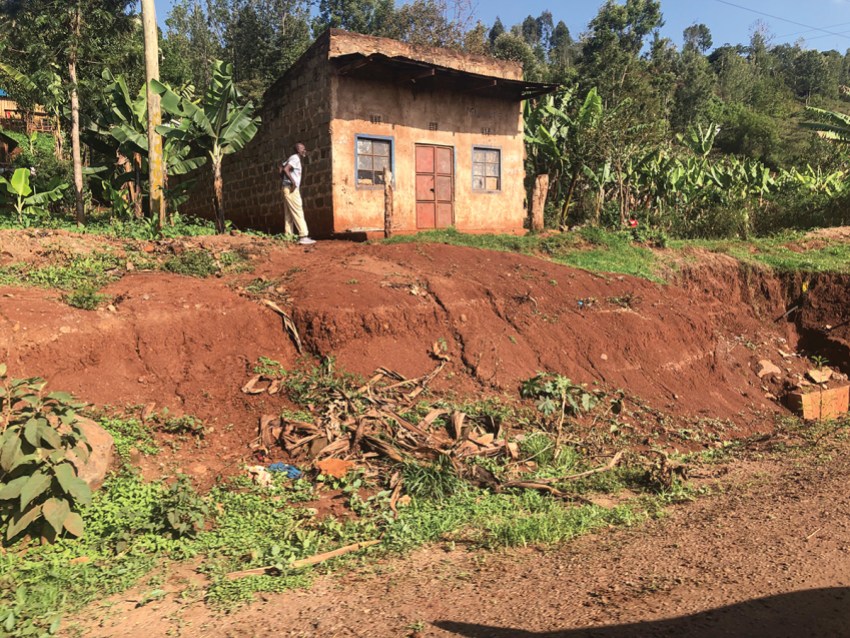
But all major rose breeding firms are located overseas, so the journey for any new variety from international selection field to the Australian home garden is a long and, at times, challenging one.
Australia’s strict border security helps keep damaging pests and diseases from our shores, so any rose material heading here needs to comply with quarantine regulations and be sourced from a country free from harmful plant pathogens. This all requires import permits, other documentation and a raft of inspection and fumigation protocols to be adhered to; new roses arrive as bare sticks. Once these “sticks” are here, the new buds on each stem are grafted onto understock plants in an authorised quarantine facility – like the one I have at my property in Myponga.
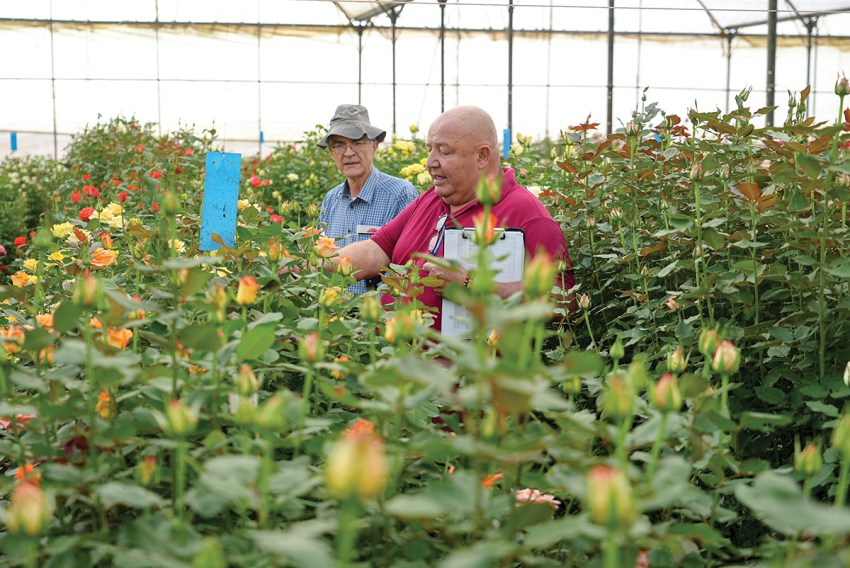
As Europe, the United States, New Zealand and recently Japan are off the list of available export countries, I turned to Kenya, but my first go at importing rose budwood from the African country early in 2022 was a disaster. The buds were sent to Adelaide via air express (a normal method of despatch). The consignment landed here successfully, was then held, inspected, fumigated and finally available for release, but unfortunately, the small box of budwood suffered some heat exposure somewhere on its journey (I suspect) resulting in a total wipe-out of useable buds. Looking at the blackened buds, my heart sank, thinking of all the wonderful roses that could have been trialled and given an opportunity to become the next new release.
Worried another consignment could share the same fate, I hatched a plan – head over to Kenya, cut the buds myself and bring them back in my hand luggage. Sounds simple, doesn’t it?
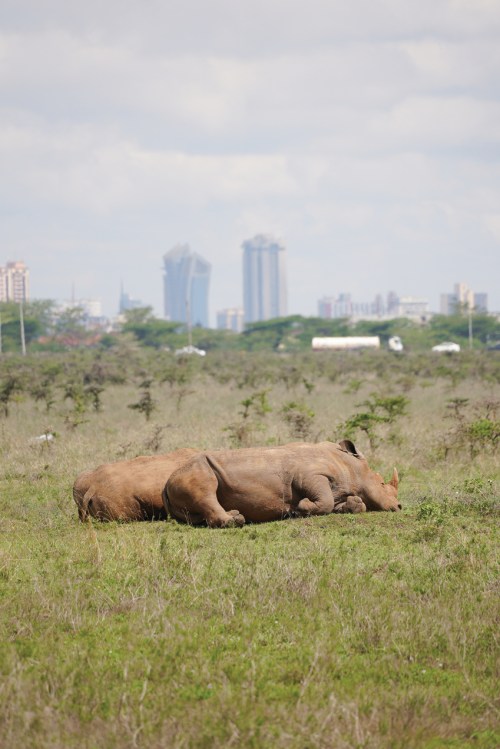
My first problem came in the form of the weather: cooler than expected temperatures in Kenya meant predicting flowering times was a little tricky, and as each week went by and I waited for the temperatures to climb, so too did the airfares.
Finally, I fixed a date: December 9, 2022. The only catch was the stop-overs – 20 hours in Doha on the way over and 10 hours there again on the return. Thanks to the FIFA World Cup in Qatar, hotel rooms there were in excess of $1000 a night and not fancying my chances of getting any sleep lying on the ground in Hamad International, I managed to book an in-airport sleep pod.
With four weeks until my departure date, I dusted off the passport, got myself vaccinated against yellow fever, typhoid and meningococcal, sorted my travel insurance, put together a small pharmacy of gastro- and malaria-related medicines, then clutching my Kenyan visa incorporating a hurriedly taken headshot resplendent with two-day stubble (at least that’s what I’d look like on arrival in Nairobi), popped on my Covid mask and away I went.
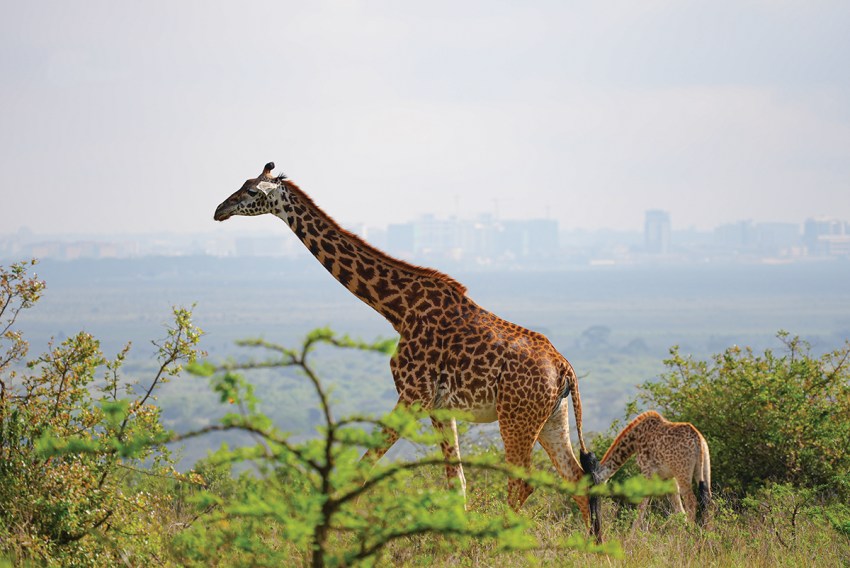
It had been three years since I last flew internationally and I’d forgotten the “joy” of a long flight and that crumpled feeling after a 13-hour haul. Hamad International Airport in Doha was incredible: open spaces and a newly planted “orchard” spectacularly filled with advanced trees under the enclosed glass ceiling was a perfect place to stretch the legs and get some much-needed steps in.
But I still had 19 hours to wait until my next flight. Sleep beckoned. Tucked between gates C30 and C31 was the Sleep & Fly counter from where I was led through a door into a long room filled with rows of timber veneered capsules. Looking quite dystopian, the door of my compact pod slid open to reveal a chair which, when laid flat, filled the space. Airconditioned, charging points and space to hang clothes, everything a weary traveller needed for an eight-hour stay. After a surprisingly comfortable sleep, a shower, time in the pay-as-you-go Oryx Lounge, it was off to Nairobi.
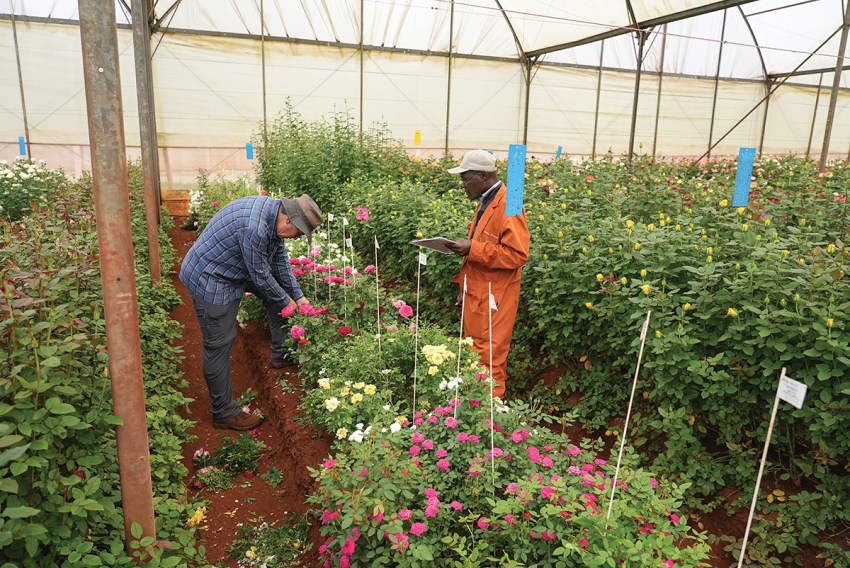
The only eventful moment on the flight was an hour before landing when the pilot announced a reminder to all passengers that plastic bags were banned in Kenya and fines applied if caught with them. A scramble ensued, overhead lockers opened, bags riffled through and any offending plastic bag quickly removed. Didn’t read about that on Smartraveller!
Through the predictable hustle and bustle of Nairobi’s Jomo Kenyatta International Airport, I was grateful to see the beaming faces of my Meilland colleagues, Jean, a French rosarian who has called Africa home for more than 35 years and Bruno, Meilland’s agency manager based in France.
Arriving at my hotel, the vehicle was stopped and searched prior to entering the compound, while a bag x-ray and personal metal detector screening had to be passed before reaching the lobby; high security procedures were performed routinely throughout my stay.
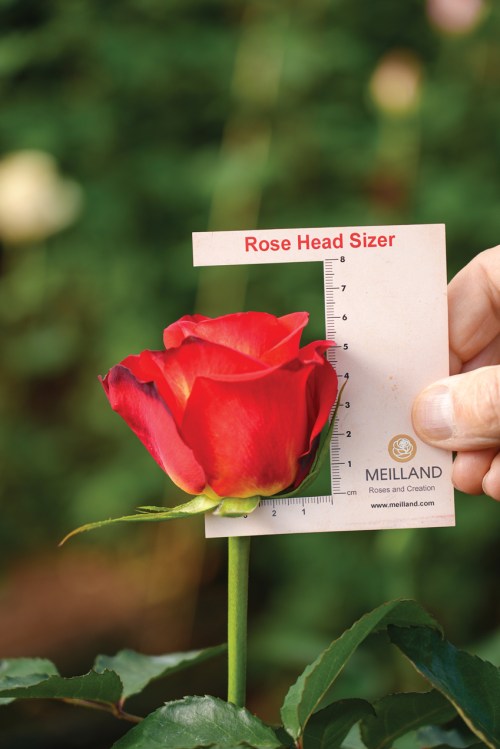
The next day, we headed off on a safari tour. Being my first time in Africa, the chance to get among wild animals was not to be missed so, armed with only a few hours’ sleep and a camera with telescopic lens, we all spent an amazing morning being driven around Nairobi National Park. It didn’t disappoint: my index finger worked overtime as I snapped countless photographs of lions, rhinos, giraffes, crocodiles, impala and a host of others. What an experience; but with only five days in Kenya, it was over to the roses.
Meilland International’s Show House, based at Penta Flowers in Thika, some 42 kilometres northeast of Nairobi, is where all their new garden and cut flower roses are grown and trialled. Upon entering, clothed entirely in plastic, the sight of thousands upon thousands of rose blooms creating a spectacular riot of colour was breathtaking.
Among the sea of cut flower varieties, I spied my garden beauties looking fit and healthy. Over 60 cultivars, some compact growers, some tall, other shrubs and climbers, mixes of hues, flower shapes, fragrances and all yet to see the light of commercial day, just waiting to be cut and head off on a long journey to Adelaide, for trialling and testing to see which ones will get the nod to finally grace our Australian gardens.
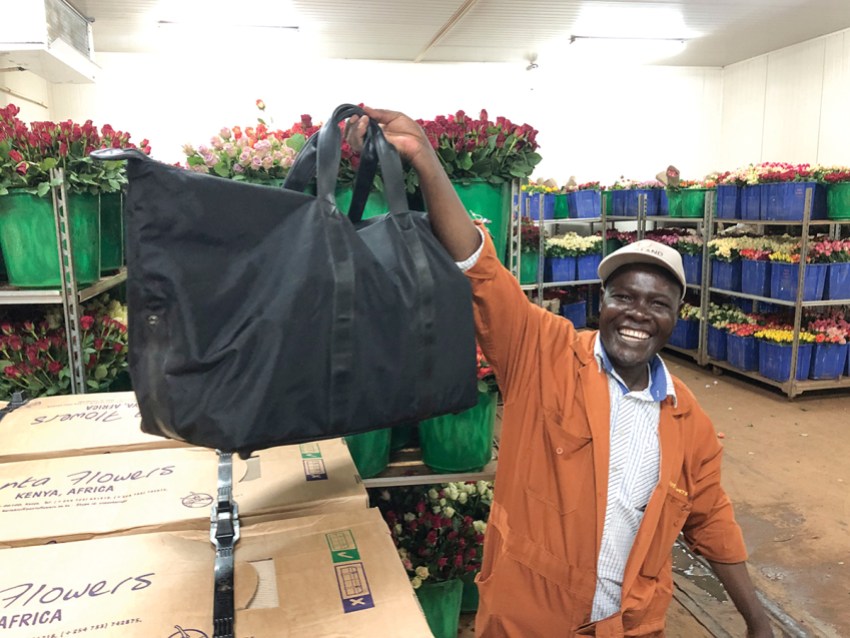
It’s Kenya’s equatorial climate that allows Meilland International to assess garden roses for their performance and with about 4500 hectares grown under cover, Kenya is the world’s biggest exporter of cut roses. Thanks to its latitude, neither heating nor lighting is required.
Cut flowers are an important industry to the Kenyan economy and one that was, thankfully, deemed “essential” during the Covid global pandemic, ensuring the livelihoods of hundreds of thousands of workers. Penta Flowers is one of many companies that are Fair Trade certified and are regularly audited, ensuring workers’ rights along with safe working conditions, fair pay and ethically produced products.
With Jean, Bruno and the newly arrived, Guillaume from Meilland’s breeding team, we spent countless hours in polyhouses over many farms identifying and assessing new cut flower cultivars for their performance and flower quality.
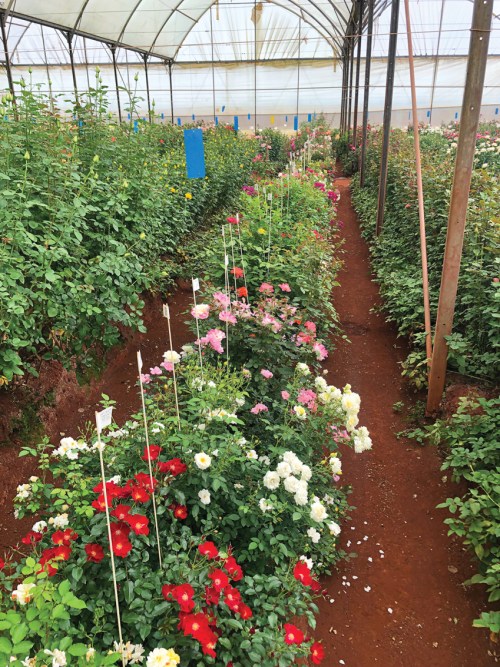
Located near Mount Kenya, Uhuru Flowers grows roses at an altitude of 2500 metres; with Adelaide’s Mt Lofty at 710 metres, I considered putting my breathlessness down to altitude rather than poor fitness. It was a surprise to see what this elevation did to the flowers. The same varieties grown nearby at Thika (at 1500 metres altitude), produced blooms up to double in size. With different markets across the globe preferring different sized blooms, knowing how an unreleased cut flower rose performs at the varying altitudes can be a major factor in its potential commercialisation.
Back to Penta Farm, secateurs in hand, I cut the flower stems of my garden roses, trimming off blooms and foliage, leaving only the bare stems filled with dormant buds. Code numbers were written on tags and matched to respective bundles. The budwood was then boxed, documents attached and safely placed in my carry-on luggage, when it was time to say farewell to my friends – old and new – and head back to the airport to make my way home. That’s right, my treasured budwood packed in my carry-on.
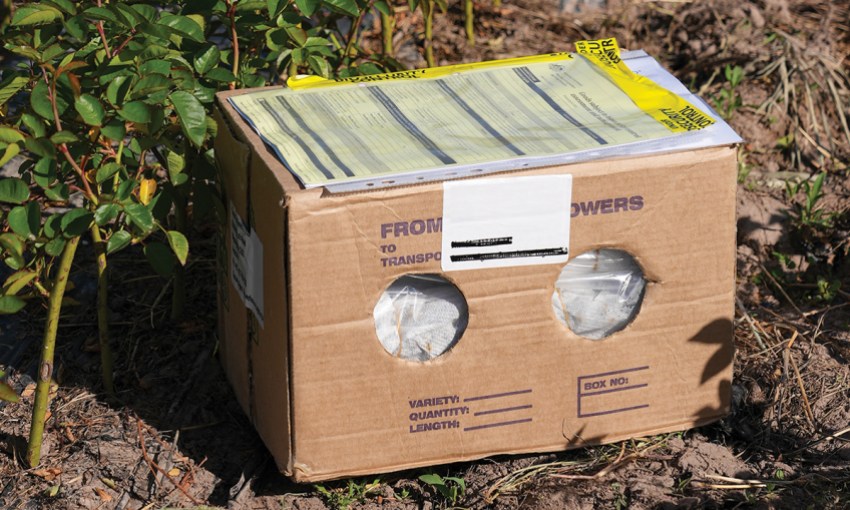
Constantly worried about the transit status of my perishable goods, it was a great relief to move between flights and airports on my way to Adelaide without incident.
Needing Adelaide as the first and only point of disembarkation into Australia to comply with quarantine requirements, the Department of Agriculture, Fisheries and Forestry (DAFF) staff were ready and expecting me. I said goodbye to my rose buds as they were placed in a refrigerator … and then waited.
Over the next few days, under DAFF control, the stems were inspected and cleared for pests and disease, fumigated with methyl bromide and finally released into my care. Now safely grafted to understocks in my quarantine facility at Myponga, I wait patiently for the fruits of my Kenya trip to grow and bloom. What a journey. Asante – thank you – Kenya!



